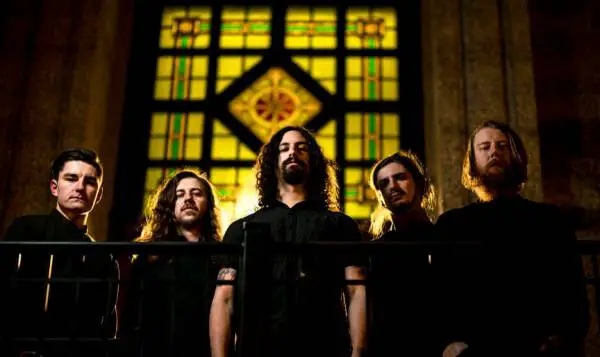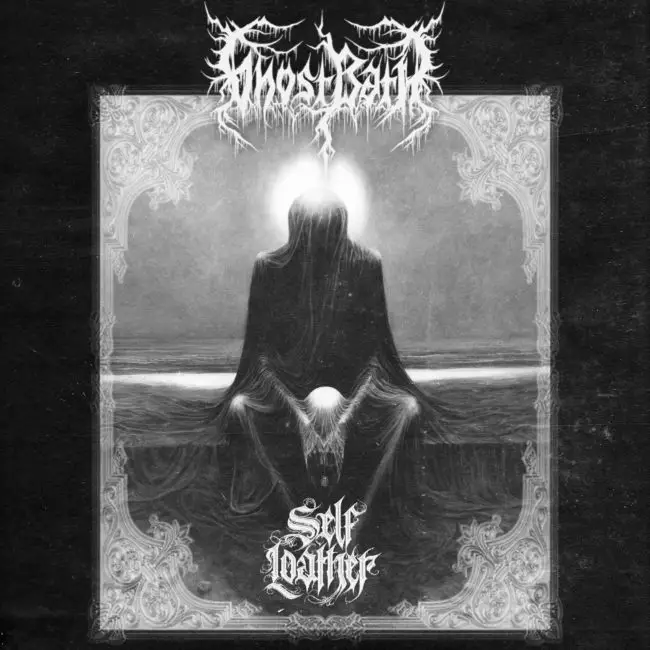
Depressive black metal outfit GHOST BATH return from touring Europe and North America in support of Starmourner (2017) and the vice-like grip of the pandemic with striking new album, “Self Loather.” In many ways, “Self Loather,” the group’s fourth album, represents GHOST BATH’s forward trajectory (musical) and continued exploration of antipathy of the self (lyrical), but unlike any album before it and as the final piece in the Moonlover-Starmourner-Self Loather triptych, it’s the group’s most destructive yet contemplative record to date. While that might have something to do with everyone contributing—though founding member Dennis Mikula (vocals/guitars/synths/lyrics) remains the visionary core—the unquestionable allure of “Self Loather” is its songs. From the raw strength of opening track “Convince Me to Bleed” and the melancholy of the strings/piano-driven “Sanguine Mask” to the grandiose horror of “Hide from the Sun” and the slow-burn groove of “Unbearable,” this is GHOST BATH at their creative best.
“This album was always a part of my creative vision,” Mikula says. “I had imagined this final record of the trilogy to be heavier, more devastating, dark, and vicious. It is by far the record most filled with hatred. I believe it is also the material most different from Starmourner that we’ve created. The three basic human emotions I wanted to capture were tragedy (Moonlover), ecstasy (Starmourner), and dread/hatred (Self Loather). While at the same time, all of these express depression and sorrow. I believe in this record we found our sound. I was finally able to unleash the full range of my vocals, using my lowest lows, to my highest shrieks.”
Formed by Mikula under a shroud of mystery and intrigue—early rumors had the band originating from Chongqing, China — as a solo project in 2012, GHOST BATH eventually emerged from their self-imposed veil as originating in the small town of Minot, North Dakota. But the importance of location isn’t as significant as who is behind GHOST BATH — principally Mikula but also Tim Church (guitars), John Olivier (guitars), Joshua Jaye (bass), and Jason Hirt (drums)—and their intentions as they reach outward and onward with their music and lyrics. This is, after all, depressive black metal, where themes of diffidence, reserve, and self-disgust conjoin with the power and awe of nature. “Self Loather,” turns out, is no different from its predecessors in that regard, but increased seclusion (due to lockdowns) and the simple expanse of Mikula’s environs have had a greater impact.
“Our environment has certainly had a big impact on this new record,” says Mikula. “I live in North Dakota, in a small town, and so isolation and loneliness have always been a part of my life. I have never truly fit in with any single group, or ideology, or even culture for that matter. With the lockdowns, protests, and general chaos of the United States during creation of this album, I believe we were all pulling from these isolating and detached times, being forced to turn inward and focus on introspection and self-reflection. That is what is illuminated most within these tracks.”
The writing for “Self Loather” started in the dying months of 2018. Unlike previous albums where Mikula was the sole proprietor, GHOST BATH’s new album was band-realized. Though the rest of GHOST BATH reside a city and state away— Minneapolis, Minnesota—they were able to employ a wide variety of writing methods. Some songs were written by members in retreat, while others were pieced together during jam sessions at the GHOST BATH rehearsal space or finalized over the Internet via file-sharing. Indeed, no two songs were conceived, crafted, refined, and completed alike.
For example, “Sinew and Vein” was written entirely at TreeSpeak Recording Studios in Minneapolis, as the tracking for “Self Loather” had commenced. The result is a wider variety of song styles, moods, and expressions.
“I believe that every track on this record has its place,” Mikula says. “If we were unhappy with any track, it wouldn’t have made it onto the album. We wrote quite a few more tracks than the 10 on Self Loather and only went with what fit the best. Each track is intense, unique (compared to the same boring riffs of most black metal), and dynamic. ‘Sinew and Vein’ explores a creeping vibe, while tracks like ‘Flickering Wicks of Black’ are unrelenting and energetic. And even with such variance, they all tie together in a single idea. Hatred of self.”
On previous albums, Mikula expressed himself mostly with glossolalia or speaking in tongues. From Obituary to Dead Can Dance, ecstatic utterances, as they’re called in religious circles, formed most of GHOST BATH’s “lyrics.” While the sentiment and import behind his prose were unquestionable, the method the songwriter chose was moored in confidence, or the lack thereof. Self Loather is the first album for which Mikula has expressed himself in definable language. What was previously too personal has given way to an apathetic view of what the outside thinks of the inside and what it’s trying to reveal. It doesn’t matter who knows the inner workings of Mikula’s soul or the boundaries of his spirit. Even the title, Self Loather, is meant to be read uncloaked.
“The new title does continue the title trend for the trilogy with one exception,” says Mikula. “My original plan was to have the sun, moon, and stars, along with a potent human emotion to go along. But when I began the writing for this album, both music and lyrics, I couldn’t help but feel that the sun had nothing to do with it. The original title was Sunloather, and though I hate the sun, I found that it did not fit with the theme of everything we were forming. There is something I hate much more than the sun. And so we made the decision to forego the cosmic prefix and replace it with the true nature of this album. Self.”
“Self Loather” was produced by GHOST BATH at TreeSpeak Recording Studio with Xander Moser engineering. The group entered the Minneapolis-based studio several times over a year, starting in December 2019 and ending in December 2020. The sessions were impacted by the limitations brought on by the pandemic but also the violent protests that erupted across Minneapolis-Saint Paul. To wit, GHOST BATH and Moser had to contend with burning buildings only a block away from the group’s practice space. Nevertheless, Mikula and the team persevered, bringing on studio ace Jack Shirley (Deafheaven/Oathbreaker) to mix and master at The Atomic Garden Recording Studios in Oakland, California between December 2020 and January 2021.
“We wanted a different recording experience for this album,” Mikula says. “And so as much as we enjoy working with Josh Schroeder, and recommend him to all who want to make a metal album, we had to change the scenery. We had to change the process. We had to change things up to keep things fresh and not stagnant. We also recorded this album in several sessions throughout 2019 and 2020. It became a challenge to get into the correct mindset to properly express what I needed, and so sometimes I would just need to wait until the following session to do either my guitar or my vocal parts.”
“Self Loather” is crowned by a stunning cover piece by famed (and deceased) Polish artist Zdzisław Beksiński. Indeed, with most artwork, the goal is to cause question, to stun, to inspire a journey with the viewer. The minute Mikula stumbled upon Beksiński’s evocative and transportive painting, he knew it was the right fit for GHOST BATH. It was a visual counterpart to Mikula’s isolationist and depressive feelings and their respective inclusion in his music. As with the covers for Moonlover and Starmourner, so too with the Beksiński piece for “Self Loather,” it’s going to resonate profoundly and broadly with those to whom it uniquely speaks.
“With any art, the most important aspect is that it makes you feel something,” says Mikula. “That it results in a reaction, whether good or bad or anything in-between. This piece represents the isolating and depressive feelings I have endured, and that fueled the creation of the music. I believe I have a talent for choosing visual pieces that fit with our music. The numerous Moonlover and Starmourner cover tattoos can attest to that. I think I am good at finding something that can connect with many humans—not all—and the cover of ‘Self Loather’ is no different.”
As for what GHOST BATH want out of Self Loather—apart from the minutia of gratitude that they are the creators—is for the affected to own and infuse it with their own life experiences. Mikula isn’t demanding others to arrive at the same destination or derive thought or determination from the same dark corners of hatred, depression, and self-loathing. Rather, his hope, however futile, is for the spark of indifference to not fuel a conflagration, whereby Ghost Bath’s raison d’être on “Self Loather” is downplayed at best or flat-out ignored at worst. Mikula’s outgoing message aligns with that.
“Once this album is released, it belongs to any who listen to it. It is no longer my place to tell others what they should or shouldn’t feel. I can explain what I felt while making it, but that won’t do any good for others with their own unique life experiences. If others can connect with the hatred, the depression, and the self-loathing that I felt while creating this piece of art, then I suppose that would be a job well done. It would only be a failure if others feel nothing at all while they listen.”
Read our review here.
